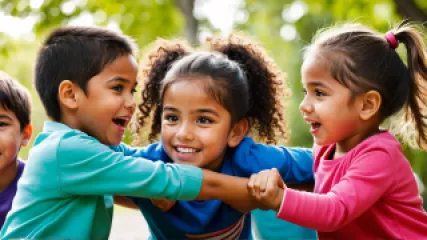How to Cultivate Kids' Inner Strength
Children's emotional strength and mental well-being are essential for their overall development. As parents, educators, and caregivers, it is our responsibility to cultivate kids' inner strength and resilience to help them navigate life's challenges with confidence and grace. Building resilience in kids not only supports their mental health but also equips them with the necessary skills to cope with adversity and bounce back stronger.
Why is Inner Strength Important for Kids?
Inner strength refers to the ability to remain emotionally stable and resilient in the face of difficulties. It empowers children to persevere through challenges, adapt to change, and maintain a positive mindset. Developing kids' inner strength is crucial because:
- Enhances Mental Health: Cultivating inner strength contributes to children's mental well-being by promoting self-confidence, reducing anxiety, and fostering a healthy sense of self.
- Improves Coping Skills: Kids with strong inner strength are better equipped to handle stress, setbacks, and disappointments, developing effective coping mechanisms along the way.
- Promotes Independence: When children possess inner strength, they become more self-reliant and capable of making decisions, solving problems, and taking responsibility for their actions.
- Facilitates Healthy Relationships: Inner strength enables children to establish and maintain healthy relationships by fostering empathy, compassion, and effective communication.
Resilience-Building Strategies for Kids
Now that we understand the importance of cultivating inner strength in children, let's explore some practical strategies to promote resilience:
1. Encourage Emotional Expression
Allow children to express their emotions openly and provide a safe space for them to share their thoughts and feelings. Validate their emotions and help them understand that it is normal to experience a wide range of emotions.
2. Teach Problem-Solving Skills
Guide children through problem-solving exercises, encouraging them to brainstorm solutions, weigh the pros and cons, and make informed decisions. This fosters resilience by empowering kids to tackle challenges with a proactive mindset.
3. Foster a Growth Mindset
Teach children that failure is an opportunity for growth and learning. Encourage them to view setbacks as stepping stones to success and emphasize the importance of perseverance and effort in achieving their goals.
4. Promote Healthy Risk-Taking
Encourage children to step out of their comfort zones and try new things. Whether it's participating in a new activity or speaking up in class, taking calculated risks helps children build confidence and develop resilience.
5. Cultivate Strong Support Networks
Help children build meaningful connections with family, friends, and mentors who can provide emotional support and guidance. These relationships serve as a valuable source of strength during challenging times.
6. Practice Mindfulness and Self-Care
Teach kids techniques for managing stress and anxiety, such as deep breathing exercises or practicing mindfulness. Encourage regular self-care activities, such as engaging in hobbies, getting enough sleep, and maintaining a balanced lifestyle.
7. Set Realistic Expectations
Avoid placing unrealistic expectations on children and instead focus on their individual strengths and efforts. Celebrate their achievements, no matter how small, to instill a sense of accomplishment and boost their self-esteem.
8. Model Resilience
Lead by example and demonstrate resilience in your own life. Children learn best through observation, so showing them how you navigate challenges with a positive attitude can inspire and motivate them to develop their inner strength.
9. Encourage Self-Reflection
Teach children the importance of self-reflection and self-awareness. Help them identify their strengths, weaknesses, and areas for growth. This self-awareness enables them to make conscious choices and take actions aligned with their values.
10. Provide Unconditional Love and Support
Ensure children feel loved and supported unconditionally. Let them know that your love for them is unwavering, regardless of their successes or failures. This creates a secure foundation from which they can explore the world and develop their inner strength.
Conclusion
Building resilience in kids is a journey that requires time, patience, and consistent effort. By implementing these resilience-building strategies, we can equip children with the tools they need to thrive in an ever-changing world. Remember, fostering children's inner strength not only benefits their mental health but also empowers them to face life's challenges with courage and resilience.






